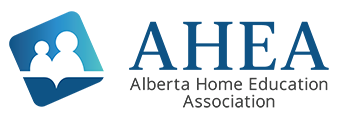
Home Education in Alberta (under the Home Education Regulation) Compared to Home-Based School Programs (under the Education Act)
It is important to know that there are two ways to homeschool in Alberta: parents may notify of their intent to home educate their children or they may register their children in a school program that takes place at home. In Alberta, the term “homeschoolers” can refer to families who homeschool by means of:
- a parent-directed home education program that is operating and funded under the Home Education Regulation;
- a teacher-directed home-based school program (including online programs) that is operating and funded under the Education Act and other associated regulations;
- a “shared responsibility” program (formerly known as “blended”) consisting of both a parent-directed home education program and a teacher-directed home-based school program.
Home Educating under the Home Education Regulation
With home education, parents make a choice to retain the responsibility to direct and deliver the education of their children under the Home Education Regulation (HER). The parents notify a willing school board or private school of their intent to home educate, and the parents determine, provide, and evaluate the home education program; it is the role of a teacher-facilitator assigned by the school board/private school “to conduct at least two evaluations of the progress of the student in each school year” (HER 4[2)][b]). The parent decides how evaluations take place and if any testing is to be done. When choosing this form of education, parents are eligible to receive 50% of the home education funds designated towards the program for reimbursement of instructional materials and resources. Home educating under the Home Education Regulation offers the greatest degree of parental control.
Home-Based School Programs under the Education Act
Home-based school programming does not fall under the Home Education Regulation at all. In this situation, parents grant the government the control over their children’s education. There are no provisions for educational resource reimbursement for students in home-based school programs, and such programs operate under the Education Act and other pertinent regulations but not the Home Education Regulation. Students enrolled in home-based school programs are considered to be as much a part of the public or separate school system as the students who physically attend institutional schools. The responsibility for program delivery and evaluation belongs to the school board, which will deliver the Alberta Program of Studies by means of a certified Alberta teacher using government-approved resources; this may include online programs that are delivered electronically to the students in their homes. The school, through the teacher, is responsible for providing the program as well as for correcting and grading all assignments. The students’ education is fully the responsibility of the school board; parents have the least amount of control with this option.
Shared Responsibility Programs
Shared responsibility programming (formerly known as “blended”) consists of two distinct parts:
- a home-based school program where a teacher employed by a school board or accredited private school is responsible for providing for the delivery and evaluation of courses aligned with the Alberta Program of Studies as per the Education Act and pertinent regulations; and
- a home education program which operates under the Home Education Regulation.
A shared responsibility program will usually consist of 50% to 90% typically of a teacher-directed home-based school program, with the remaining 10% to 50% consisting of a parent-directed home education program. The parent chooses which parts of the education program falls under each category.
AHEA and Home Education
The Alberta Home Education Association (AHEA) has always affirmed the right of parents to retain the responsibility of teaching their children. We believe God has equipped parents to direct the education of their children. We believe that programs that may compromise this right and these responsibilities need to be carefully evaluated by each individual family. If a parent desires and is able to exercise exclusive direction of their child’s program, then home educating under the Home Education Regulation is the preferred option if a parent desires to maintain their parental authority over their child’s education.
Home Education Compared to Home-Based School Programs
| Home Education | Home-Based School Program | |
|---|---|---|
| The parent. . . | . . .chooses to retain control of his or her child’s education. | . . .chooses to give responsibility for his or her child’s education to the government. |
| The government considers this to be. . . | . . .home educating. | . . .public education at home. |
| The program is taught by. . . | . . .the parent or a person designated by the parent. | . . .a certified Alberta teacher hired by the applicable board. The parent may be permitted to support the teaching. |
| Who is ultimately responsible for the program? | The parent is responsible. | The school board/private school is responsible. |
| What curricula can be used, and who chooses it? | A wide variety of parent-selected curriculum options are available, including unit studies, literature-based studies, textbooks, workbooks, DVDs, online classes, APS, and various complete curriculum packages. | The school has the authority for the program and the curriculum, which are to meet the requirements of the Alberta Program of Studies (APS). |
| Who evaluates the student? | The parent assesses the student’s progress, and the parent and student meet twice each school year with their facilitator (a certified Alberta teacher) who will evaluate the student’s progress. | Evaluation, assessments and testing are the responsibility of the teacher/school. |
| How much government funding is received per student for the 2020/2021 school year? | $850 is provided to the parent and $850 to the school board/private school (as per the 2017/2018 Funding Manual for School Authorities) for each child in Grades 1 through 12. | The school board receives a base instruction rate of several thousand dollars per student; none of this funding may be offered to the parent for reimbursement of resources, lessons, or materials. |
| Relevance of the Home Education Regulation? | A home education program operates under the Home Education Regulation. | Home-based school programs do not fall under the Home Education Regulation but instead operate under the Education Act and any other associated regulations. |
Shared Responsibility Programs
Shared responsibility programs (formerly known as “blended”) are homeschooling programs that comprise a parent-directed home education program operating under the Home Education Regulation AND a teacher-directed home-based school program operating under the Education Act. Typically, 50% to 90% of a shared responsibility program will consist of a teacher-directed home-based school program, with the remaining 10% to 50% consisting of a parent-directed home education program.
